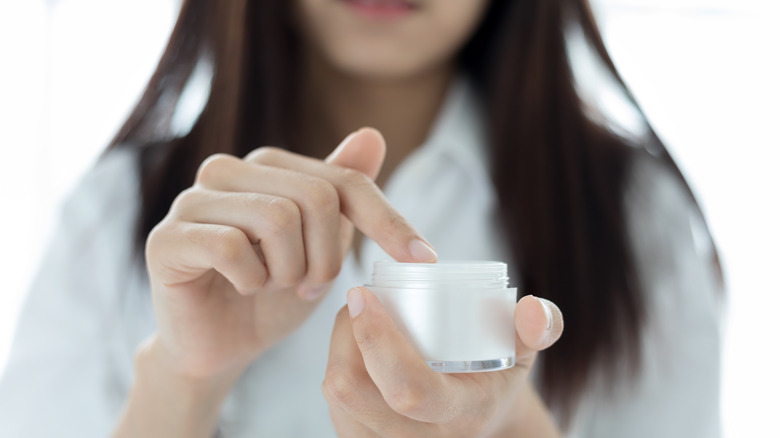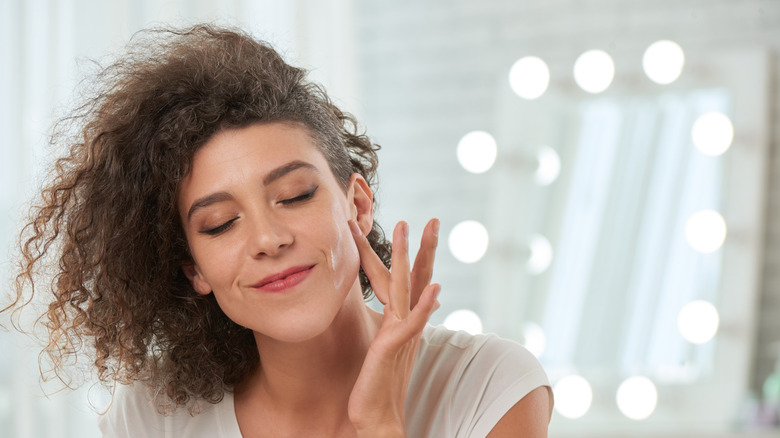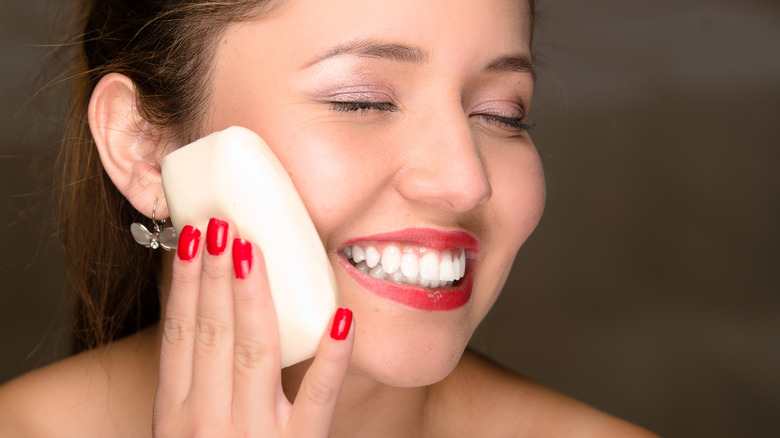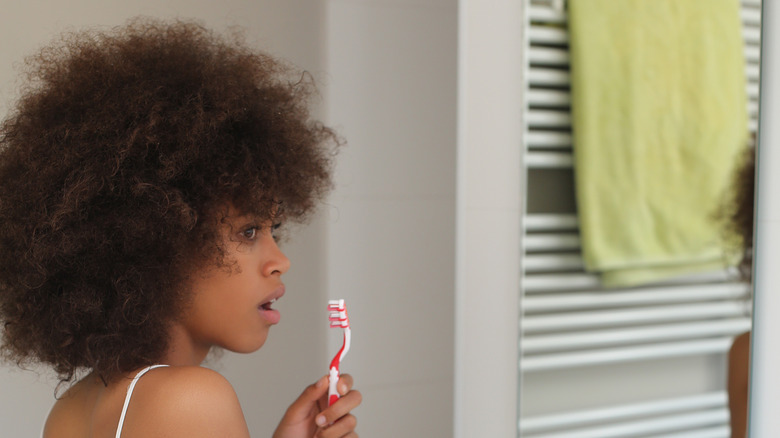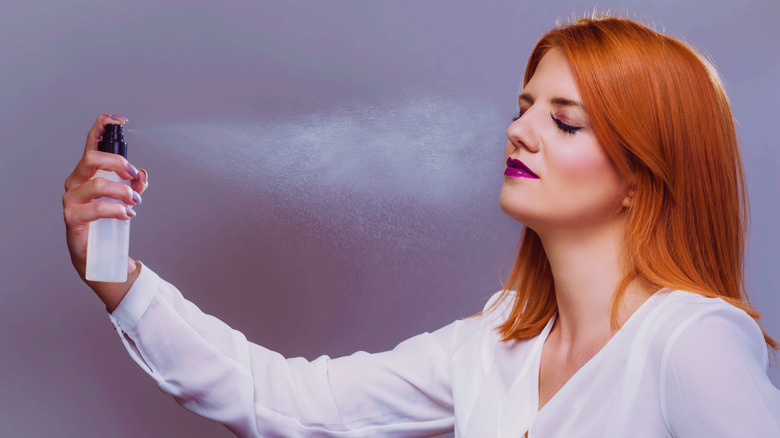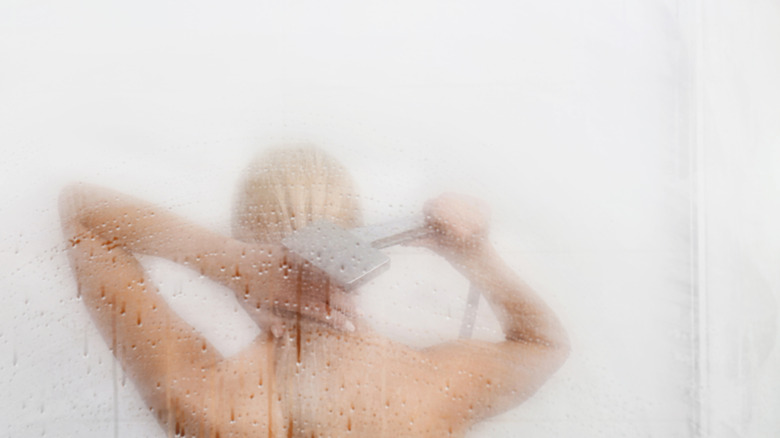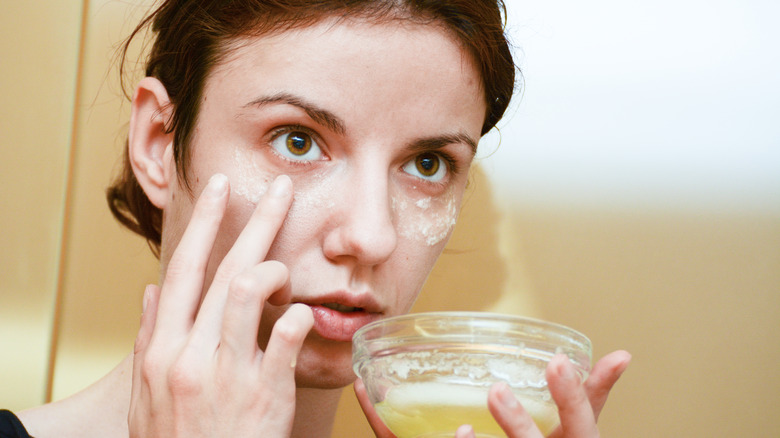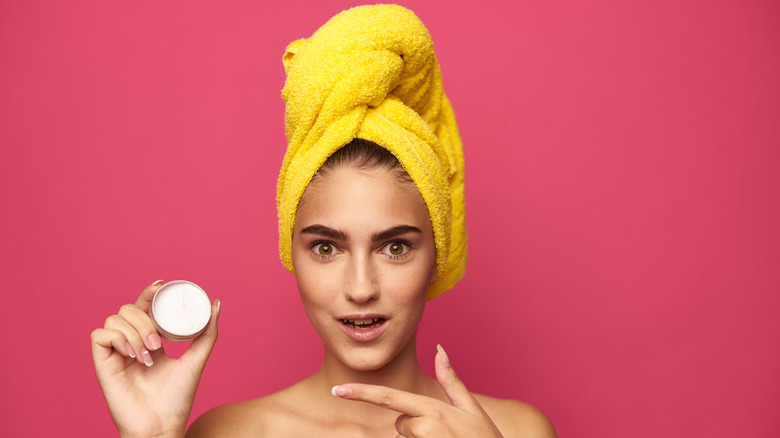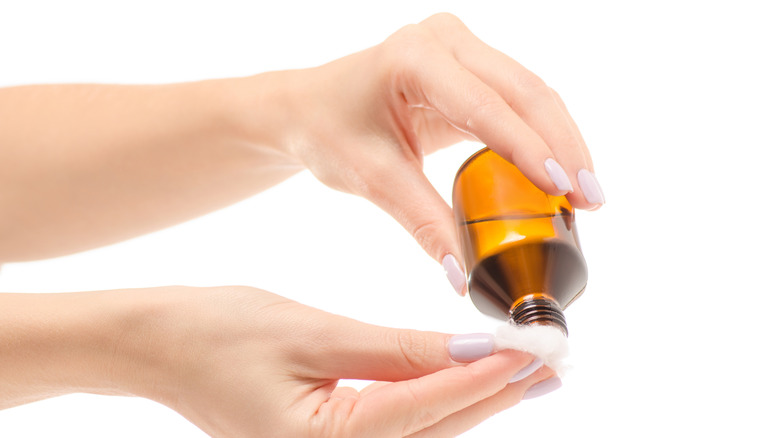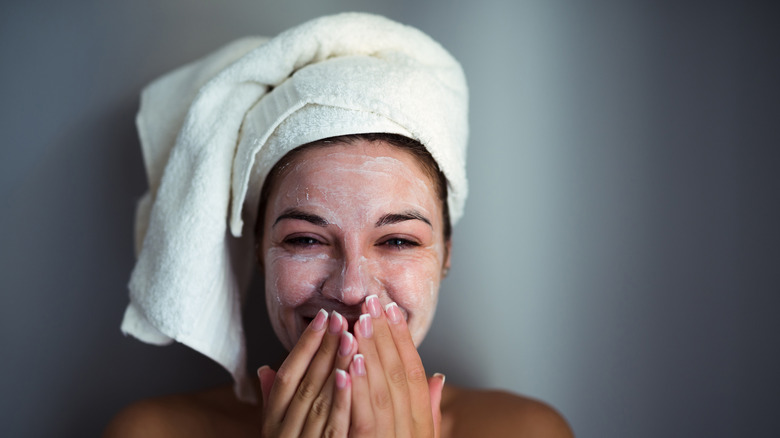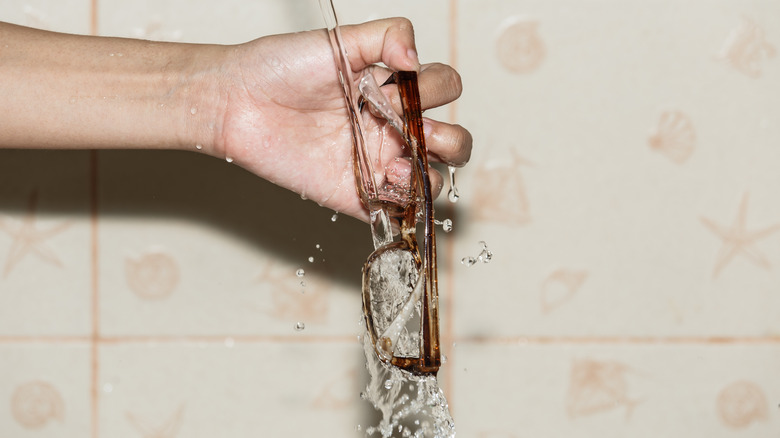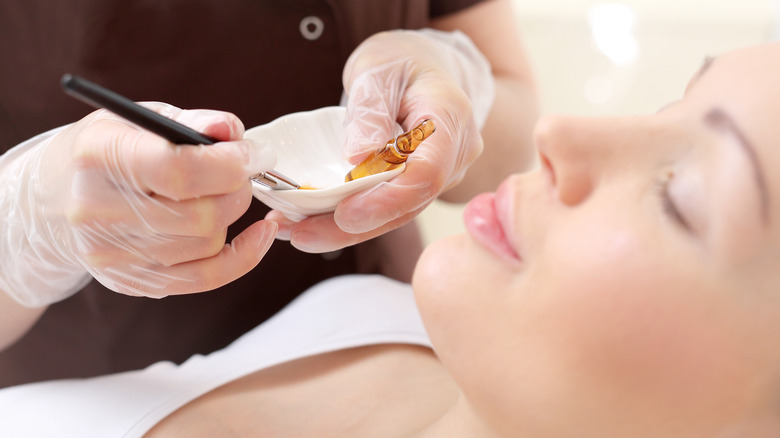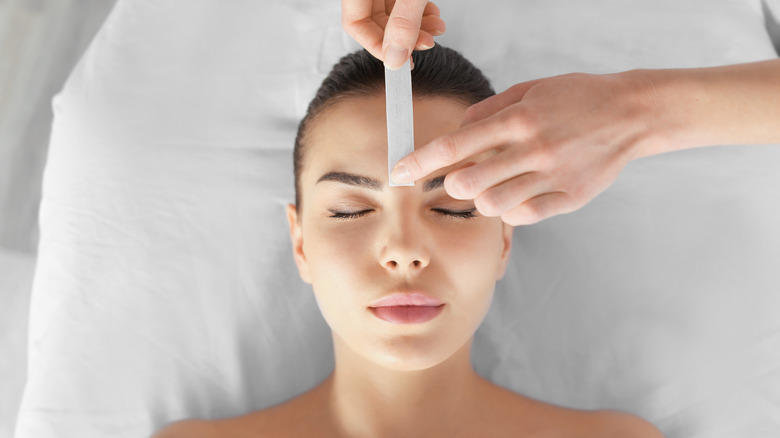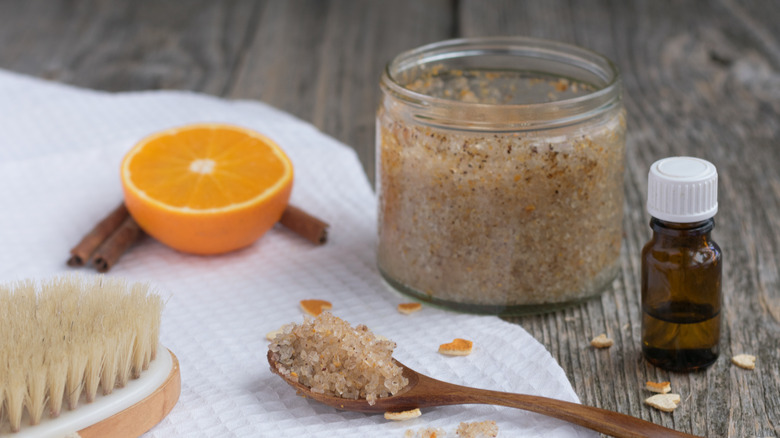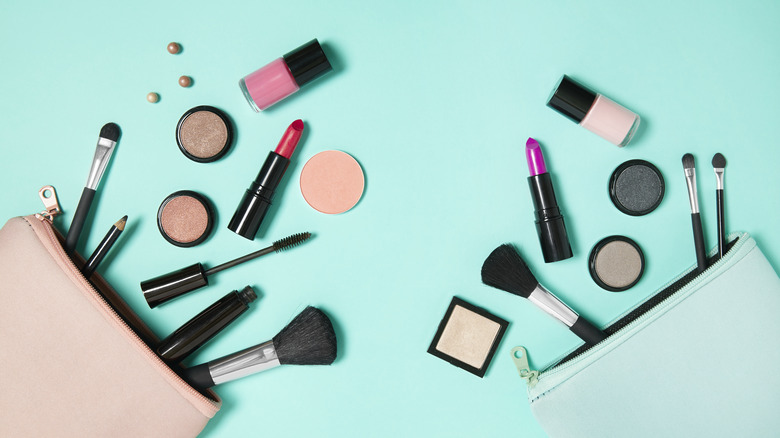Things You Should Never Put On Your Face
How many beauty products do you use in your skincare and makeup routine? According to The Telegraph, the average woman uses 16 — per day. It's no surprise, then, that the beauty industry is booming.
While these products may be selling at a steady pace — global sales should reach $130 billion by 2019 — that doesn't necessarily guarantee their safety. Believe it or not, cosmetics — including skincare products — are "very lightly regulated" by the Food and Drug Administration (FDA), according to Fortune.
Although cosmetics are required to contain labels, companies can cry "trade secrets" to avoid having to share what they've used. Additionally, anyone who's anyone can sell these products. Steve Xu, a resident physician in the department of dermatology at Northwestern University Feinberg School of Medicine, confirmed to Fortune that no documentation, pre-market approval, or registration is even required. Yikes!
If you're now thinking you'd be better off just DIY-ing your skincare products, that isn't always a surefire way, either. The best option? Leaving this matter up to professionals. According to the experts, here are some things you should never put on your face.
Body lotion is a no
How many times have you run out of facial moisturizer and decided to just use some body lotion? In a pinch, it's fine, right? Well, probably, but routinely lathering your face with lotion that's designed for your body is a big fat nope.
Michael Kaminer, a board-certified dermatologist and cosmetic surgeon explained to Skincare.com, saying, "[Doing this] too often can lead to blocked pores." Of course, no one wants to deal with blocked pores!
"If you're staying at a hotel and you have to use the body lotion they have on your face, it's probably fine," Kaminer explained. It's the habitual use that's the real problem. If you've been relying on body lotion for your whole body, you should look for moisturizer specifically designed for your face.
"Moisturizers provide key nurturing ingredients to your skin, leaving you with a clean and hydrated surface," Dermatologist Ellen Marmur told Self.
Avoid the bar — soap that is
Just what should you be using to wash your face? As a kid, you may have used a handy dandy bar of soap. As an adult, however, that's not the best idea.
"Washing the face is a complex interaction," Zoe D. Draelos, a clinical associate professor of dermatology in Winston-Salem, North Carolina, explained to Fox News. "Cleansing the skin is a fine balance between balancing the skin's hygiene and leaving substances that are integral for the functioning of the skin."
Bar soap just doesn't seem to be able to strike that delicate balance. "I never, ever use a harsh, regular soap as a face or body cleanser," Marmur said when speaking to Power of Positivity. "Regular" soap, or bar soap, actually strips your skin of the nutrients it needs. This is because the soap utilizes chemicals that are both tough on the skin and unnatural. The result is "rough, dry, and itchy [skin]," Marmur explained.
Toothpaste is for teeth
It may sound a little silly, but when you've developed a zit, and you want it gone immediately, you're likely to try anything — even toothpaste. If it's safe to use on your teeth then it must be safe to use on your skin, wouldn't you think? Unfortunately, that's not true.
While people have been using and touting toothpaste as a "zit-zapper" for years, it's simply bad advice. "It's just not good for your skin over the long-haul," Kaminer told Skincare.com. While it most likely will help to dry out the pimple, toothpaste can irritate your skin and has the potential to be overly-drying.
That's not to say you have to forego spot treatments, you just shouldn't use toothpaste. Alternatives, according to Kaminer, include products containing benzoyl peroxide or salicylic acid. Salicylic acid, a type of beta-hyrodxy acid (BHA) works to exfoliate the skin and get rid of dead skin cells while benzoyl peroxide works by fighting off and killing acne-causing bacteria, according to Dermatologist Whitney Bowe's comments to Teen Vogue. Both are great choices for spot-treating those pesky pimples.
Hairspray is not a substitute for setting spray
Setting spray, also called finishing spray or makeup setting spray, is a really useful tool in helping your makeup stay put all day. You simply mist and voila! Your makeup is set in place and you can stay all dolled up without the fear of your makeup breaking up. Well, couldn't you just use hairspray to achieve the same result? People do, but that doesn't make the tip full-proof.
David E. Bank at The Center for Dermatology in Westchester, New York recognizes the affordable trend of using hairspray as setting spray but he doesn't endorse it. "Hairspray contains alcohols, which can strip the skin of moisture," he explained to Bustle. "It can also clog your pores and lead to irritation and acne flare-ups."
Setting sprays, on the other hand, "destroy bacteria while keeping makeup in place," Dermatologist Dendy Engelman explained to Refinery29. This makes the sprays far superior to misting your face with water and/or hairspray.
When life hands you lemons, don't put them on your face
Does citrus belong in skincare? Some think so, but just remember the last time you peeled an orange or cut a lemon without realizing you had a cut on your hand. Not exactly a rejuvenating experience, was it?
Additionally, lemons contain the chemical psoralen, New York Dermatologist Doris Day, explained to CNN, and you can't put lemons on your face without also transferring psoralen. This powerful chemical makes your skin very sensitive to light. According to Day, it takes as few as ten minutes to activate and as long as 24 hours to wear off. If you were to then go out in the sun, your skin could actually blister. Ouch!
"I see it on people at the beach if they're having a Corona or a margarita," Day explained. "Because they squeeze the lemon and get a rash on the back of their hand. It's the splatter pattern of how they squeezed the lemon, and the sunburn effect." Now imagine that — but on your face. No thanks.
The same is apparently true with limes and lime juice, which are actually common DIY acne treatments, reported Reader's Digest. The thinking behind it is that, due to the antioxidants and antibiotic quality in limes, it will cause skin renewal. Instead, it causes blisters much like lemons, and can even cause abnormal skin coloring that Dermatologist Alejandra Vivas told Reader's Digest can last for months. Yikes! Let's add that to the list of things you should never put on your face, for sure.
Hot water = horrible
How hot do you take your showers? Chances are, probably too hot. The best shower temperature for your skin is around lukewarm, Sejal Shah, a dermatologist in New York City, explained to Women's Health. Most experts agree that water below a temperature of 110 degrees is best.
That means if your water feels hot, it is too hot. If your skin is red after your shower, that's a good indicator too. "Hot water strips the skin of its natural oils leading to dry, itchy skin and eventually eczema," Shah explained. It's also harsh on your hair because it strips away your natural oils causing your hair to become dry. That dryness, Shah explained, can also cause color to fade faster if you are someone who colors your hair.
Even outside of the shower, you shouldn't be using hot water. Bank told Bustle, "Many people like to use hot water on their faces because they think it will help kill bacteria, however, hot water can actually strip the moisture out of your outermost layer of skin." This is truly a sad day for hot water lovers.
Egg white masks? Pass
The internet abounds with egg white mask concoctions. There's so many that you could make the assumption that they're completely safe. Not so. "You have to be careful with the egg white mask because egg whites sometimes have salmonella," Day told CNN.
Although you cannot get salmonella from just putting egg whites on your skin, the chances of you ingesting egg whites becomes greater. Consequently, your chance of getting salmonella is increased. "So these days, unless you know the source of the eggs, I would be very careful with that one," she recommended.
Despite the risks, many still use the homemade masks. Why? According to Day, egg whites can cause your face to experience a short-term tightening effect and "a little relief" for oily skin. The risks seem to outweigh the benefits and, with so many other options on the market, there's not a very compelling argument to stick with egg white masks.
"Secret" ingredients
Just as skincare and beauty companies can get out of listing their products' ingredients by claiming they contain trade secrets, they can also sell the secrecy to you — à la "miracle" creams. Nevertheless, you shouldn't buy in to the scheme.
"Never use products that do not list out their ingredients," Boca Raton Dermatologist Jeffrey Fromowitz explained to Reader's Digest, "You must know what you are putting on your skin." Otherwise, you won't know if you're allergic to any of the ingredients until trying it. Plus, even if you're not allergic, you could be lathering your face with an ingredient you shouldn't even be putting on your face.
What should you use instead? "When in doubt, discuss the product or your skin need with your dermatologist who can guide you toward safe and effective product choices, specifically tailored for your skin type and problem." Makes sense. Time to say buh-bye to those expensive mystery creams.
Hydrogen peroxide hurts more than it helps
There's no denying the fascinating, albeit gross, experience of pouring hydrogen peroxide on a cut. The frothing bubbles, the noise — you just know it's getting all up in there to clean. However, you really should only use peroxide on cuts when you first injure yourself. After that, it will counteract the healing properties of your skin and it will take you much longer to heal, Day explained to CNN.
As for putting hydrogen peroxide on your face as a cleanser, just don't do it. Similar to lemons, peroxide can have a lightening effect on both skin and hair. This is why some people use it as DIY hair color though really, they shouldn't. Peroxide can irritate the skin, according to Day. She added, "Peroxide is toxic to skin cells."
Hydrogen peroxide's primary industry use is not for bleaching hair or skin but for bleaching paper, according to the National Poisons Information Service, in a study published by the National Center for Biotechnology Information (NCBI). If you were to get peroxide in your eyes while using it on your skin, it could cause irritation, stinging, and possibly blurred vision. Washing "contaminated skin" with "copious amounts of water" is recommended. Obviously it's an ingredient you should never put on your face.
Using glue as a homemade blackhead remover
Like peroxide, glue can be fun to put on your skin. It's okay, you can admit it. However, just because glue is amusing to peel off, that doesn't imply it's something safe for you to use. A popular beauty hack on Instagram is the DIY blackhead remover made by mixing charcoal powder and Elmer's glue. Instagram account DIY Remedies shared their version, claiming, "I don't have black heads but it removed all the white heads that I had!"
It may work but your dermatologist would likely advise you against trying it. "I do not recommend this practice, as glue is not formulated for skin care," Shereene Idriss, a dermatologist from Wexter Dermatology told Glamour.
That said, just because something isn't made for skincare, that doesn't mean it's necessarily dangerous. After all, oatmeal is "not a bad thing, and it's inexpensive and fun to do at home," Day explained to BuzzFeed. Other common and inexpensive items, like teabags, can be beneficial to your skin as well. Tea can soothe red, irritated skin and, as Dermatologist Esta Kronberg explained to Reader's Digest, "Chamomile tea, used as a cold compress, can relieve itchy eyes."
Not every household item is safe for use on your skin, however, and glue is but one of them. "It can cause skin irritation and hypersensitivities, resulting in scarring and changes in pigmentation," Idriss further explained. The time to return your Elmer's glue to your kids is, unfortunately, now.
It isn't just your face that needs washed
When's the last time you cleaned your eyeglasses? You wash your face everyday but, your glasses? That seems a bit much. As it turns out, though, that's exactly what you should be doing. Dirty eyeglasses hanging around on your face are a big no-no.
Karen Gladstone, an optometrist at Arrigg Eye and Ear Associates in Lawrence, Massachusetts, explained her reasons to Oprah magazine. Much like your phone, your glasses are a breeding ground for bacteria. Not to mention, oil and dirt. The nosepiece is especially susceptible because it makes the most contact with your skin. If you've ever had a break out along the bridge of your nose, your glasses were likely the culprit. The more you know!
Gladstone recommends rinsing your glasses — every day — under warm running water with a little bit of dish soap. To preserve your lenses, dry your glasses with a microfiber of soft cotton cloth.
DIY chemical peels
Chemical peels used to be something you could only receive from professionals. The name may sound harsh, but chemical peels in and of themselves are not actually bad. In fact, they're really good for your skin.
In fact, they "can actually deliver certain skin benefits — like reversing melasma and breakouts — better than high-tech devices," Day told Allure. It's the at-home variety you need to watch out for.
"I NEVER put strong chemical peels on my face at home," Angela Lamb, a dermatologist at the Mount Sinai Hospital, enthusiastically told Health. She explained that people sometimes end up purchasing medical-grade chemical peels, which are way too strong for a DIY peel. "I've seen bad results," she continued, "such as redness and too much peeling than can lead to long-term scarring and discoloration."
As if that wasn't enough, Day said some people also experience allergic reactions to the peels. The verdict on this one is pretty apparent: Just because you can buy DIY chemical peels it doesn't mean you should.
Wax on? More like wax off!
Raise your hand if you get your eyebrows waxed on a regular basis. You're not alone. According to StyleCaster, since the early 2000s, women have been using "pencils, waxes, powders, gels, and more" to get the iconic bold brow we all have come to know and love. There's just nothing quite like having perfect brows. That said, wax is not the recommended method to achieving them.
Jennifer MacGregor, a dermatologist at Union Square Laser Dermatology, explained to Insider, "The hot wax adheres to your skin and pulls off a layer along with the hair. If you use retinoids or exfoliants regularly it could even cause you to blister, burn, scab or scar. Ouch!" Yes, "ouch" sounds about right.
Thankfully, there is an abundance of other options to get your ideal eyebrows including laser hair removal, threading, and good old fashioned tweezing. Forgoing the wax shouldn't be too hard then, right? Hopefully.
Scrub those scrubs from your beauty routine
Sugar scrubs, salt scrubs, and pretty much every other kind of scrub have been all the rage in recent years. Some dermatologists think they're fine for use on the face, like Howard Lancer, a Beverly Hills dermatologist. "I have all my patients get in the habit of using a physical scrub ... every single day, as it actually teaches the skin cells to turn over more quickly, mimicking the action of youthful cells," he explained to The Cut. Other dermatologists, however, are anti-scrub.
Manhattan Dermatologist Neal Schultz explained to The Cut that scrubs are problematic. A lot of that is because of the variables, like the amount of time a person scrubs and the amount of pressure being applied when scrubbing. Additionally, different scrubs, naturally, contain different ingredients. Some are especially abrasive.
If you must use a scrub, Schultz recommends one with micro-grains. While Schultz has a more neutral view of the popular skincare treatment, scrubs get no love from Dennis Gross, another Manhattan dermatologist.
"Scrubs are a primitive way to exfoliate. It's like using sandpaper on your face," he told The Cut. He further explained, saying, "If you look closely at the sandpaper surface, you'll see lots of scratch marks, and that's what happens on the skin."
Products expire for a reason
You probably wouldn't dare to drink an expired glass of milk, but would you use expired makeup? It seems innocuous enough, but there's good reason to toss your old skincare products and cosmetics.
Jeremy Brauer, Clinical Assistant Professor at the Ronald O. Perelman Department of Dermatology, explained to Reader's Digest that when products expire, the active ingredients within them become inactive, which means the product will no longer work the way it was intended. In turn, the product could also cause skin irritation. This is true even if your expired products look and seem fine.
Brauer recommends looking at expiration dates when shopping for cosmetics. If you find products with an expiration date in the very near future, that means it's already been sitting around and aging on the store's shelves and definitely among the things you should never put on your face. Brauer also recommends setting up calendar reminders on your phone to alert you when your products are near expiration.
So, if you can't remember the last time you wore that Barbie pink lipstick, you may want to take a peek in your makeup bag and get tossing.

